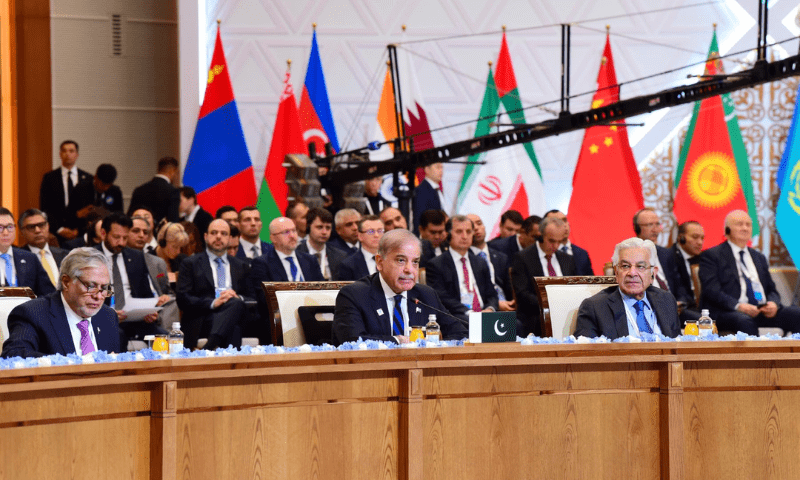
[ad_1]

• Delegates from Mongolia, Turkmenistan, C’wealth of Independent States, European Economic Community also expected to attend moot
• PM likely to use event to deepen Pakistan’s diplomatic ties with regional powers
ISLAMABAD: Leaders from the Shanghai Cooperation Organisation (SCO) member states will convene in the federal capital next week for the 23rd meeting of the Council of the Heads of Government (CHG), with the goal of advancing regional economic cooperation and strengthening socio-cultural ties.
The summit, scheduled for Oct 15-16, will also address pressing issues such as environmental collaboration and organisational performance.
Nine of the 10 member states are being represented at the prime-ministerial level, considering that the office of the first vice president in the Iranian system is equivalent to that of the prime minister.
Prime Minister Shehbaz Sharif, as the current Chair of the CHG, will preside over the leaders’ meetings, which will be held at the Jinnah Convention Centre.
The CHG, the second-highest decision-making body in the SCO, plays a pivotal role in shaping the organisation’s economic initiatives and deciding institutional matters.
The gathering is expected to result in the adoption of key measures aimed at enhancing economic partnerships among member states and approving the SCO’s budget for the upcoming year.
The summit will bring together Chinese Premier Li Qiang, Russian Prime Minister Mikhail Mishustin, Belarusian PM Roman Golovchenko and Iran’s First Vice President Reza Aref. Kazakhstan’s Prime Minister Olzhas Bektenov, Kyrgyzstan’s Akylbek Japarov, Tajikistan’s Kohir Rasulzoda, and Uzbekistan’s Abdulla Aripov are also expected to participate in the meeting.
India’s Minister for External Affairs S. Jaishankar will represent his country.
Observer states like Mongolia, represented by Prime Minister Luvsannamsrain Oyun-Erdene, and special guests such as Turkmenistan’s Deputy Chairman Rashid Meredov will also be in attendance.
Representatives from international organisations like the Commonwealth of Independent States and the European Economic Community are also expected to participate.
Foreign Office spokesperson Mumtaz Zahra Baloch, at her recent briefing, emphasised the summit’s importance in driving enhanced economic cooperation, trade, and environmental collaboration across the region.
“This meeting will serve as a crucial platform for adopting important decisions aimed at strengthening ties among SCO member states,” she said.
The leaders will discuss and review key initiatives related to trade, environment, and socio-cultural linkages, with the intention of boosting regional stability and cooperation.
PM Shehbaz is also expected to hold several bilateral meetings with visiting heads of delegation on the sidelines of the summit, aiming to enhance Pakistan’s diplomatic ties and cooperation with regional powers.
Founded in 2001, the SCO is an influential platform for fostering regional security, economic collaboration, and cultural exchanges among its 10 member states: China, India, Kazakhstan, Kyrgyzstan, Pakistan, Russia, Tajikistan, Uzbekistan, Iran, and Belarus. The organisation has grown in prominence as a forum for addressing both economic and security challenges in the region.
However, the summit comes at a time of heightened security concerns in Pakistan. A recent attack in Karachi by Baloch nationalists on a convoy of Chinese workers left two Chinese nationals dead. The targeted Chinese nationals were working at a local power plant but the attack, which was apparently timed ahead of the visit of Chinese premier, has raised security concerns about the safety of visiting leaders.
Compounding the situation, the opposition Pakistan Tehreek-i-Insaf (PTI) has announced protests in Islamabad on Oct 15, the same day the summit begins.
These demonstrations are expected to further complicate security arrangements in the capital, as PTI seeks to exert political pressure on the government.
In response to these challenges, the government has deployed military personnel in the capital under Article 245 of the Constitution till Oct 17 to improve security arrangments. Strict restrictions have been placed on movement within Islamabad’s Red Zone, which houses key government buildings and foreign embassies, including the summit venue. Access to the area has been limited, and the movement of foreign diplomats has been curtailed to mitigate risks.
Published in Dawn, October 13th, 2024
[ad_2]
Source link






